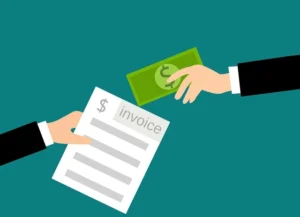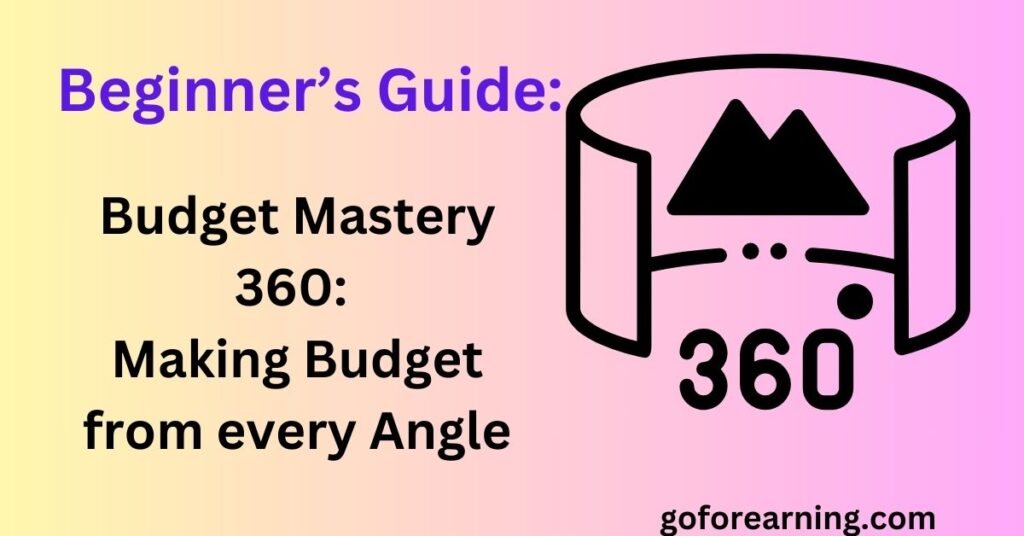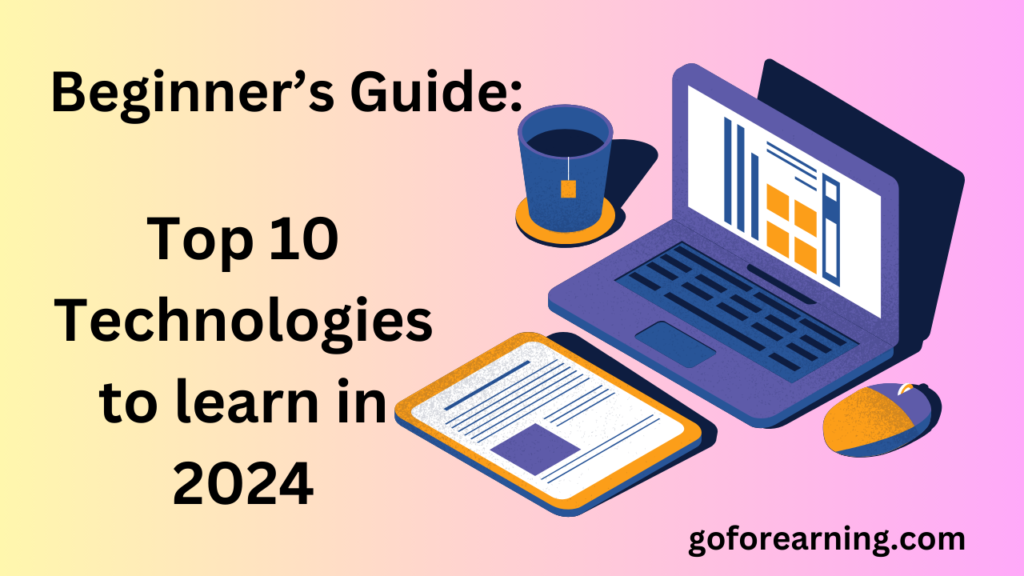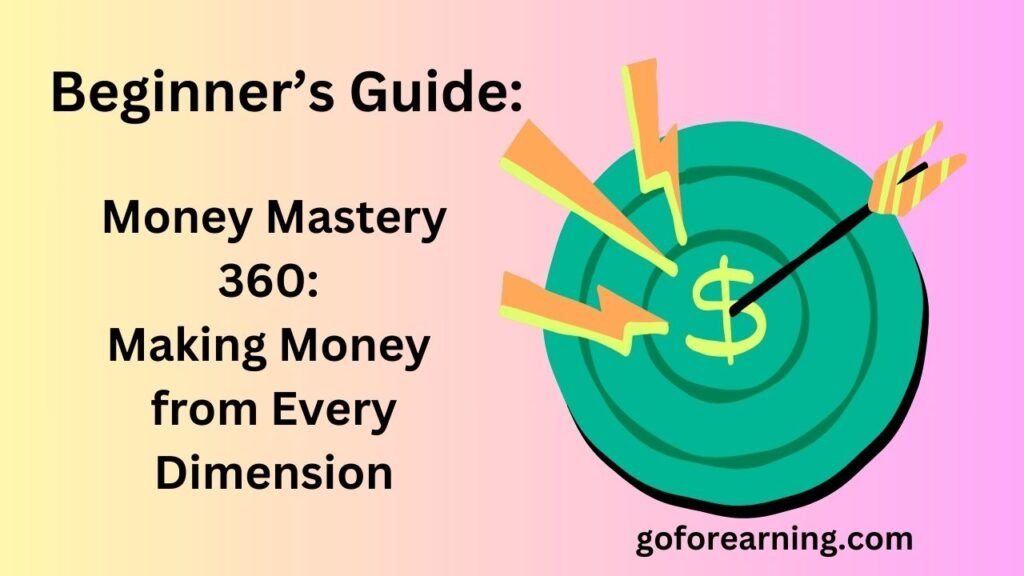Budgeting isn’t just a way to limit spending; it’s also a way to gain financial independence. This detailed guide will go into more detail about Budget Mastery 360. We will look at every part to help you make a budget that works for your current living and helps you get ahead financially in the future.
Calculation of income

Analyses of Different Sources of Income:
Learn more about each source of income. Learn not only how much each source is, but also how stable and predictable it is. This will help you make a more accurate plan.
Including Irregular Income:
Think about different kinds of income, like gifts or money you make working from home. Create plans for how to handle unexpected income well so that your budget stays stable.
Expense Breakdown

Segmentation by Type:
Sort your spending into more specific groups. Creating sections for unpredictable costs like activities, services, and going out could help you get a better idea of how much you spend.
Spending habits from the past:
Look at past buying records to find patterns and outliers. Looking back at the past helps you make more accurate budget predictions and shows you where you might be able to save money.
Plan for an emergency fund
Figuring out the best fund size:
Think about how much money you need in an emergency fund based on things like your regular bills, how stable your job is, and any costs that come up out of the blue. This will make sure you’re ready for any unexpected cash problems that may come up.
Regular Contributions:
Set up a regular way to put money into your emergency fund. To make a strong safety net, you need to be consistent.
Managing debt
Full list of all debts:
Include all of your loans and their interest rates and terms. Based on the interest rates, decide which bills to pay off first, or think about combining your debts for a simpler method.
Strategies for Getting Out of Debt:
Look into different ways to get out of debt. This could mean making smaller payments on smaller bills over time or paying off high-interest debts first.
Savings and Investments
Savings with a Plan:
Set savings goals for the short and long run. You could put money into this for anything from an emergency fund to a down payment on a house or retirement.
Balanced Investment Portfolio:
A balanced investment portfolio spreads out investments based on your financial goals and how much risk you are willing to take. Review and adjust your stock often to keep up with changes in the market.
Apps and tools for making budgets
Using technology:
Look into the newest planning apps and tools to make the process easier. Automating tasks can make it easier to keep track of spending, set financial goals, and get real-time information.
Big Data and Personalization:
Pick tools that let you customize things and do deep research. This makes sure that the way you make your budget fits your specific goals and financial situation.
Regular Checks and Changes
Reviews on Time:
Set specific times to look over the budget. You can find and fix differences quickly when you do regular reviews.
Being flexible:
If your circumstances change, don’t be afraid to make changes to your spending. To stay financially stable, changes may need to be made because of life events, changes in pay, or unexpected costs.
Matching your financial goals
How to Spend Based on Values:
Make sure your spending shows what you believe in. Give money and time to things and activities that fit with your long-term goals and interests.
Adjustable goals that are flexible:
Be aware that your cash goals may change over time. Adjust your budget in a way that is flexible so that you can take advantage of new chances or changed goals.
Learning Resources
Always Learning:
Spend time learning about money all the time. To make smart choices, keep up with new financial strategies, tools, and market trends.
Different types of learning channels:
Check out a number of different ways to learn, such as podcasts, online classes, and books. Using different ways to learn can help you learn more about money.
Professional Guidance
Advisor Consultation:
You might want to talk to financial experts for help. A financial adviser can give you specific advice on how to make investments, plan for retirement, and take care of your general financial health.
Check-Ins Often:
Set up regular talks with a financial expert to make sure that your goals and your financial plan are still in line. Professionals can help you understand how the market is changing and suggest changes.
In the end
Budget Mastery 360 is a process that is always changing. You can master the art of planning from every angle if you learn about every part of money, keep learning, and get professional help when you need it. Taking this cautious method not only protects your finances now, but it also sets the stage for a safe and successful future.
FAQs:
1. What is Budget Mastery 360?
Budget Mastery 360 is a comprehensive approach to budgeting that includes analyzing income, breaking down expenses, planning for emergencies, managing debt, and aligning financial goals from every imaginable angle.
2. Why is budgeting important?
Budgeting is important for financial success because it provides a clear roadmap for managing income, controlling expenses, building savings, and achieving long-term financial goals.
3. How do I assess different sources of income?
Evaluate each income source by considering stability, predictability and overall contribution. This ensures a realistic understanding of your financial flows.
4. Should I include irregular income in my budget?
Yes, it is important to include irregular income, such as bonuses or freelance earnings. Develop plans to handle unexpected income to maintain budget stability.
5. What is the importance of expenditure statement?
Spending analysis helps classify spending into specific groups, providing information about habits. This enables a better understanding of where your money is going and facilitates effective budgeting.
6. How can I plan for an emergency fund?
Determine the optimal size of your emergency fund by considering regular bills, job stability, and unexpected costs. Establish a routine of making regular contributions to build a strong financial safety net.
7. What strategies exist for debt management?
Make a comprehensive list of debts, prioritize repayment based on interest rates and explore strategies like debt consolidation. Strategies may include paying off high-interest debt first or making systematic payments.
8. Why is a balanced investment portfolio important?
A balanced investment portfolio is tailored to your financial goals and risk tolerance. Regularly review and adjust your investments to adapt to changing market conditions and maintain a diversified approach.
9. How can technology help in budgeting?
Use the latest budgeting tools and apps to automate tasks, track spending, set financial goals, and get real-time insights. Personalize tools to suit your specific financial situation.
10. Why are regular reviews and adjustments necessary?
Regular budget review helps in identifying discrepancies quickly, allowing timely correction. It is important to adapt to changes in circumstances, income or unexpected expenses to maintain financial stability.
11. How can I align spending with values?
Make sure your spending reflects your beliefs and priorities. Allocate resources to activities and goals that are consistent with your long-term aspirations and values.
12. Why should I seek professional guidance?
Financial advisors provide specific advice on investing, retirement planning and overall financial health. Regular check-ins with professionals ensure that your financial planning remains in line with your goals.
13. Is Budget Mastery 360 a one-time process?
No, Budget Mastery 360 is an ongoing, dynamic process. Regular learning, adapting to changes, and seeking professional help when needed are essential components of continued financial success.
14. How can I stay informed about financial strategies?
Dedicate time to continued learning about money. Explore different learning channels like podcasts, online classes, and books to stay informed about new financial strategies and market trends.
15. What is the ultimate goal of Budget Mastery 360?
The ultimate goal is to achieve financial mastery from every angle, which not only provides immediate financial stability but also lays the foundation for a secure and successful future.





